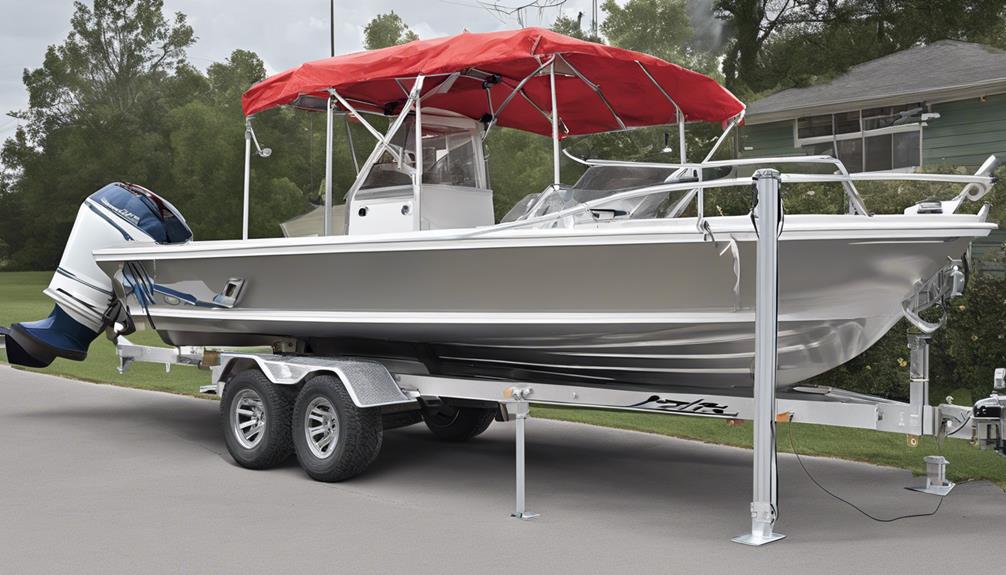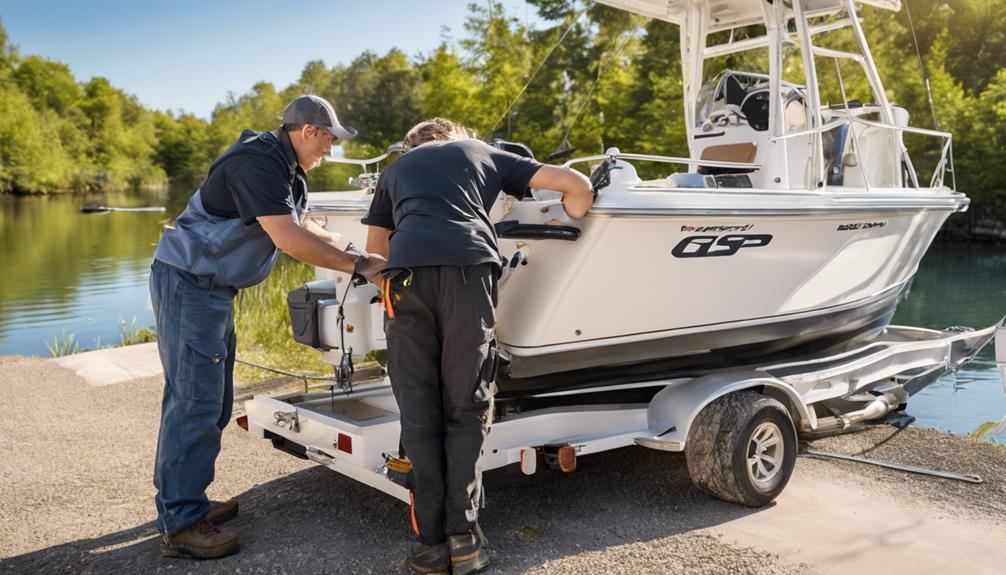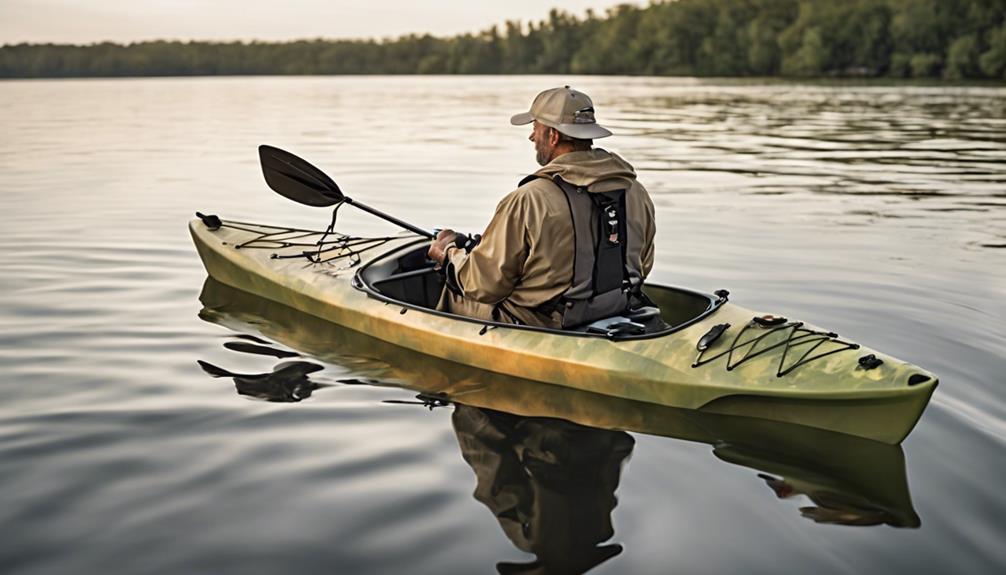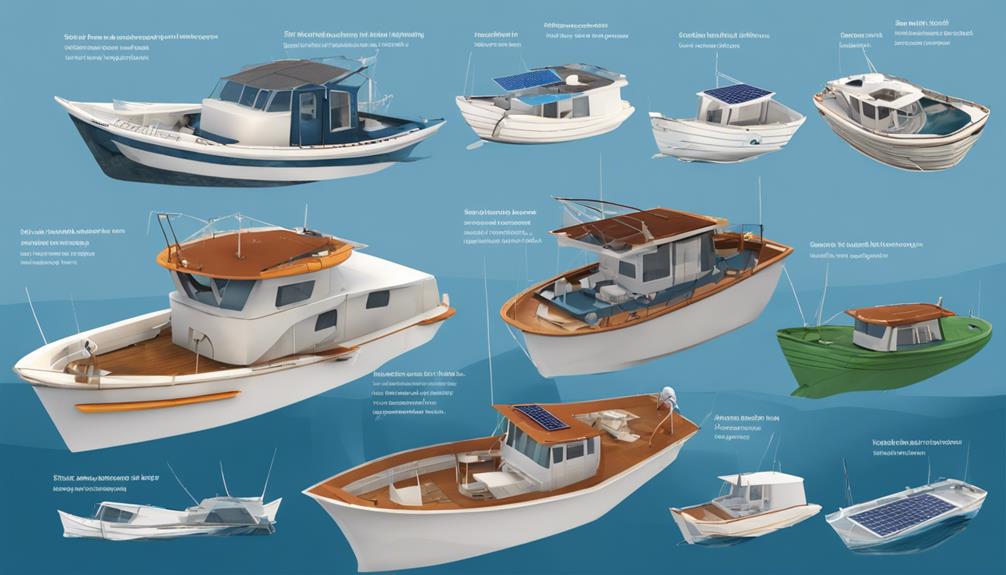If you've ever encountered the frustration of a corroded aluminum fishing boat, you know the importance of proper maintenance. Ensuring your vessel is in top shape can not only save you time and money but also enhance your overall fishing experience.
From inspecting the hull for damage to regularly checking safety equipment, these 13 handy tips will help you keep your aluminum fishing boat in prime condition.
But there's one crucial aspect that often gets overlooked, and mastering it can make a significant difference in prolonging the lifespan of your beloved boat.
Inspect Hull for Damage
When inspecting your aluminum fishing boat for damage, start by examining the hull for any signs of wear or impact. Small scratches or dents can be common due to rocks or debris in the water. To maintain the integrity of your boat, it's crucial to address these issues promptly.
For repairing scratches, you can start by cleaning the affected area with a mild detergent and water. Once dry, use a specialized aluminum boat scratch repair kit to fill in the scratches. Follow the instructions on the kit carefully for the best results.
Patching holes on the hull is another important task. Even small holes can lead to water entering the boat, causing further damage. To patch holes effectively, begin by cleaning the area around the hole with a suitable cleaner. Next, apply a marine-grade aluminum patching compound to seal the hole. Smooth out the compound and let it dry completely before sanding it down for a seamless finish. Regularly inspect the patched area to ensure it remains secure and watertight.
Clean and Wax Exterior
To maintain the overall condition of your aluminum fishing boat, it's essential to regularly clean and wax the exterior surfaces. Keeping the exterior of your boat clean not only enhances its appearance but also helps protect it from the harsh marine environment. Start by rinsing the boat with fresh water to remove any salt or debris. Use a gentle boat soap and a soft brush to scrub the exterior, paying special attention to areas with stubborn stains. Once the boat is clean and dry, it's time to apply wax to provide a protective coating.
When it comes to waxing your aluminum fishing boat, choose a high-quality marine wax specifically designed for aluminum surfaces. Apply the wax in a circular motion using a clean microfiber cloth or applicator pad. Allow the wax to dry to a haze before buffing it off with a separate cloth. This will help create a protective barrier against UV rays, saltwater, and other environmental factors. Regular waxing not only enhances the shine of your boat but also makes it easier to clean in the future.
In addition to waxing, consider applying a protective coating to the exterior surfaces of your aluminum fishing boat. These coatings can help repel water, prevent oxidation, and extend the life of your boat's finish. By incorporating these exterior cleaning and polishing techniques, you can keep your aluminum fishing boat looking great for years to come.
Check and Grease Trailer Bearings
Regularly checking and greasing the trailer bearings of your aluminum fishing boat is crucial for ensuring smooth and safe transportation to and from the water. Proper bearing lubrication is essential in preventing friction and overheating, which can lead to costly repairs and even accidents on the road. Trailer maintenance should be a routine part of your overall boat care to guarantee a hassle-free boating experience.
To start, inspect the trailer bearings for any signs of wear or damage. Look out for rust, unusual noises, or excessive play in the wheels, as these could indicate that the bearings need attention. If everything appears to be in order, it's time to grease them up. Use a high-quality marine-grade grease and apply it generously to the bearings. Make sure to spin the wheels as you grease them to ensure even distribution and maximum coverage.
Regular greasing not only extends the lifespan of your trailer bearings but also enhances their performance. By reducing friction, the grease helps the bearings operate smoothly, minimizing wear and tear. This simple maintenance task can save you from the headache of dealing with a breakdown on the road. So, make it a habit to include trailer bearing checks and greasing in your regular boat maintenance routine for worry-free travels to your favorite fishing spots.
Maintain Engine and Propeller
For optimal performance of your aluminum fishing boat, maintaining the engine and propeller is essential. Proper care of these components ensures your boat runs smoothly and efficiently during your fishing trips. Here are some key tips to help you keep your engine and propeller in top condition:
- Regularly inspect the engine: Check for any signs of wear and tear, loose connections, or leaks. Addressing these issues promptly can prevent major problems that may affect the engine performance.
- Change the engine oil: Regular oil changes are crucial for the engine's longevity and performance. Follow the manufacturer's recommendations for the type of oil and the frequency of changes.
- Inspect and clean the propeller: Remove any debris, fishing lines, or weeds that may be tangled around the propeller. Inspect the propeller for any damage and have it repaired or replaced if necessary to maintain optimal performance.
- Check propeller alignment: Misaligned propellers can cause vibrations and decrease fuel efficiency. Ensure the propeller is correctly aligned to prevent unnecessary strain on the engine.
Monitor Electrical Components
Monitoring the electrical components of your aluminum fishing boat is crucial to ensure the proper functioning of essential systems onboard. Start by regularly checking the battery maintenance to guarantee a reliable power source for your boat. Inspect the battery terminals for any corrosion buildup and clean them using a mixture of baking soda and water. Secure the battery in place to prevent vibrations that could damage the connections. Additionally, test the battery charge periodically and recharge it as needed to avoid unexpected power failures while out on the water.
Another critical aspect of monitoring your boat's electrical components is conducting thorough wiring inspections. Check all wiring connections for any signs of wear, corrosion, or loose fittings. Tighten any loose connections and replace any damaged wiring promptly to prevent electrical malfunctions. Make sure to use marine-grade wiring for durability and longevity, especially in a marine environment where corrosion is a common issue.
Regularly monitoring and maintaining your aluminum fishing boat's electrical components won't only ensure a safe and enjoyable boating experience but also prevent potential breakdowns while out on the water. By staying proactive and addressing any electrical issues promptly, you can extend the lifespan of your boat's electrical system and avoid costly repairs in the future.
Prevent Corrosion With Proper Care
To prevent corrosion on your aluminum fishing boat, diligent care and maintenance are essential. Rust prevention is crucial to ensure the longevity of your boat. Here are some handy tips to help you keep corrosion at bay through regular maintenance:
- Wash your boat frequently: Saltwater and pollutants can accelerate corrosion. Regularly rinsing your boat with fresh water after each use can help remove these corrosive agents and prevent rust from forming.
- Apply a protective coating: Consider applying a marine-grade wax or polish to create a barrier between the aluminum surface and the elements. This protective layer can help prevent oxidation and corrosion.
- Inspect for damage: Regularly inspect your boat for any signs of damage, such as scratches or dents. Addressing these issues promptly can prevent corrosion from starting in these vulnerable areas.
- Check and replace anodes: Sacrificial anodes are designed to corrode instead of the aluminum hull. Make sure to check these anodes regularly and replace them when necessary to ensure they're providing adequate protection.
Store Boat Correctly

Proper storage of your aluminum fishing boat is crucial to maintain its condition and prevent damage. When it comes to storing your boat, opt for dry storage whenever possible. Moisture can lead to corrosion and mold, so ensuring your boat is stored in a dry environment is essential for its longevity. If dry storage isn't available, using a boat cover can help protect it from the elements.
During the off-season, it's important to winterize your boat to prevent any cold weather damage. Winterizing techniques may include draining the engine of any water, adding a fuel stabilizer, and protecting the boat's exterior. Additionally, removing any valuables and electronics from the boat before storing it can prevent theft or damage.
When storing your boat, make sure it's on a secure trailer or properly supported in a storage facility. Check that the tires are inflated, and the boat is covered to shield it from dust and debris. Regularly inspect the storage area for any signs of pests or water leaks that could harm your boat.
Regularly Check Safety Equipment
Why is it important to regularly inspect the safety equipment on your aluminum fishing boat? Safety inspections and emergency preparedness are crucial to ensure you're ready for any situation that may arise while out on the water. By maintaining and checking your safety equipment regularly, you can increase the chances of a safe and enjoyable fishing experience.
Here are four key reasons why you should prioritize safety equipment maintenance and inspections:
- Life Saving Gear: Your life jackets play a vital role in emergencies. Ensure they're in good condition, properly sized for all passengers, and easily accessible in case of an accident.
- Fire Extinguishers: Check the expiry date and pressure gauge of your fire extinguisher. It's essential to have a functioning extinguisher on board to prevent and combat fires.
- Emergency Signaling Devices: Inspect your flares, whistles, and any other signaling devices. These items can help you attract attention and signal for help in case of distress.
- First Aid Kit: Regularly check and restock your first aid kit. It should be fully equipped to handle common injuries or medical emergencies that may occur while fishing.
Frequently Asked Questions
How Often Should I Replace the Anodes on My Aluminum Fishing Boat?
You should replace the anodes on your aluminum fishing boat regularly to prevent corrosion. Anode replacement frequency depends on usage and water conditions. Generally, it's recommended to check and replace anodes at least once a year.
This preventive maintenance step protects your boat's aluminum hull from galvanic corrosion. Keeping up with a maintenance schedule will help ensure your boat stays in top shape and extends its lifespan.
Can I Use Any Type of Wax on the Exterior of My Aluminum Fishing Boat, or Is There a Specific Type I Should Use?
You should choose a marine-specific wax for your aluminum fishing boat. Regular car wax won't cut it. This specialized wax is designed to protect against corrosion and harsh marine environments.
Applying it properly will help maintain your boat's exterior and prevent damage from saltwater exposure. Taking the time to wax your boat regularly can go a long way in preserving its appearance and structural integrity.
What Is the Best Way to Prevent Electrolysis on My Aluminum Fishing Boat?
To prevent electrolysis on your aluminum fishing boat, focus on corrosion prevention and cleaning techniques. Proper grounding and electrical maintenance are key. Regularly inspect and maintain your boat's electrical system to prevent stray currents.
Keep your boat clean and dry to minimize corrosion. Consider using sacrificial anodes to protect the aluminum from electrolysis. By staying proactive with maintenance, you can keep your aluminum fishing boat in great shape for years to come.
Are There Any Specific Maintenance Tasks I Should Do for the Aluminum Hull of My Fishing Boat?
To keep your boat in top shape, focus on corrosion prevention and hull cleaning. Regularly check for damage and touch up any paint chips to prevent rust.
Inspect welds for integrity to ensure your boat stays sturdy. Maintaining the aluminum hull of your fishing boat is essential for its longevity and performance on the water.
How Often Should I Have My Trailer Bearings Checked and Greased for Optimal Performance?
You should have your trailer bearings checked and greased regularly for optimal performance. Proper trailer maintenance, including bearing lubrication, is crucial to ensure smooth operation and prevent breakdowns while towing your boat.
Inspect the bearings at least once a year or more frequently if you use your trailer often. Greasing them every 12 months or every 12,000 miles is a good rule of thumb to keep everything running smoothly.
Conclusion
Overall, maintaining your aluminum fishing boat is crucial for ensuring its longevity and performance on the water. By following these handy tips, such as inspecting the hull for damage, cleaning and waxing the exterior, and checking the trailer bearings, you can keep your boat in top condition.
Remember to also regularly maintain the engine, monitor electrical components, prevent corrosion, and store your boat correctly. With proper care, your aluminum fishing boat will continue to provide many enjoyable fishing adventures.



